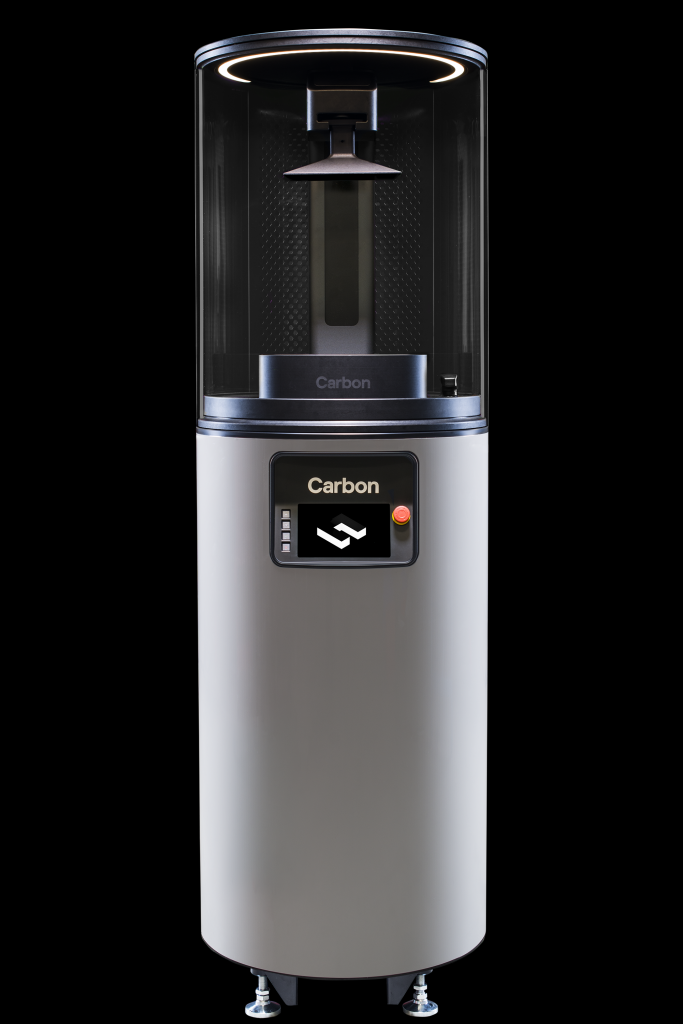Silicon Valley’s Carbon, manufacturers of continuous liquid interface production (CLIP) 3D printers, have released the SpeedCell system for industrial scale additive manufacturing. The release includes an update to the first M series 3D printer and a Smart Part Washer that ensures the perfect finish of resin parts.
Carbon CLIP technology with high temp CE resin. Clip via Carbon on YouTube
By connecteing the two systems, SpeedCell is “designed to upend traditional methods of manufacturing”. Dr. Joseph DeSimone, co-founder and CEO of Carbon, explains,
For our customers, this means that their product development cycles no longer need to include the antiquated traditional manufacturing process steps of designing, prototyping, tooling, and then production. Instead, products can be designed and engineered on a platform that is also the means of production, eliminating prototyping and tooling steps.
SpeedCell Design and Production
The all-in-one SpeedCell system essentially links an M2 3D printer to a Carbon Smart Part Washer. The system has two different configurations: Design SpeedCell and Production SpeedCell, both designed to keep designers an engineers on the same page throughout the product lifecycle.
In each configuration, Carbon provides customers with the hardware, software, materials, service and support required to achieve the desired result. The main difference in the Production SpeedCell is that it is equipped with multiple production floor compatible M2 3D printers, as opposed to an M1 or an M2 in Design SpeedCell.
The company states that, “The introduction of SpeedCell is in direct response to the needs of Carbon’s customers and strategic partners, including BMW Group and General Electric.”
3D printing service providers Fast Radius, partnered with UPS logistics, are also a launch partner of the system. Alan Amling, UPS Corporate Strategy Vice President, comments
In partnership with Fast Radius, we can immediately leverage the SpeedCell capabilities to provide our customers with on-demand products and inventory in a scalable and cost-effective way.
The updated M2
The new M Series model has twice the build volume of its predecessor, the M1. For comparison the M1 is 141mm x 79mm x 326mm (W x D x H) and the M2 is 190mm x 118 mm x 326mm (W x D x H).
Added features include an in-built ability to add serial numbers to parts; specialized interfaces for “operators” and “engineers”; “Carbon Connector” data and power expansion; and automated part removal.

Like the M1 system, the M2 is available on a subscription-based service that gives customers access to support and materials. It is available at a rate $50,000 per year, $10,000 more than the M1.
The Smart Part Washer
The Smart Part Washer “is a machine that enables optimal cleaning and easy finishing of 3D-printed parts” for all M Series 3D printers. It is designed so parts can be moved easily from print to post-processing. It also has automated solvent handling, and recycles any substance left over from the process.
Again on a subscription based service, the Smart Part Washer is available for $10,000 per year.
Advances in the post processing of 3D prints
As any maker knows, post processing can be make or break of a 3D printed object. In February 2017, the UK’s government-run innovation initiative Innovate UK granted $782,000 to a technique for post-processing FFF 3D prints. Research at the University of Illinois in Chicago is also looking to improve the process of detaching SLA 3D prints from the print bed.
With this in mind, it is clear to see how Carbon’s SpeedCell system is a reaction to demand, especially for high profile clients such as GE who are investing heavily in the additive manufacturing industry.
To stay up to date with the latest additive manufacturing releases, sign up to the 3D Printing Industry newsletter, follow us on Twitter and like us on Facebook.
Vote now in the first annual 3D Printing Industry Awards.
Featured image shows the connected SpeedCell family from Carbon. All photos featured in this article are via Carbon Inc.



